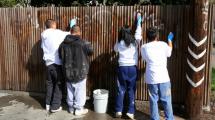Youth who receive special education services under the Individuals with Disabilities Education Act (IDEA 2004) and especially young adults of transition age, should be involved in planning for life after high school as early as possible and no later than age 16. Transition services should stem from the individual youth’s needs and strengths, ensuring that planning takes into account his or her interests, preferences, and desires for the future.
Healthy Relationships and Co-Parenting
The benefits of healthy relationships for expectant and parenting young families are multifaceted. Healthy relationship skills can improve communications among teen mothers and fathers and their family members and with each other. Whether they are in a romantic relationship or co-parents who are working together to raise their child, a healthy relationship between teen parents can help promote positive education and employment outcomes for both father and mother. It can also help promote their child’s positive development.1
Intimate Partner Violence/Teen Dating Violence
Expectant and parenting young mothers experience intimate partner violence, or teen dating violence, at higher rates than do older mothers.2 This population of adolescents is also likely to have experienced domestic violence during their childhood and which may have contributed to their teen pregnancy. Research has found that about 20 percent of pregnant teens report having experienced intimate partner violence.3
Role of Young Fathers
The involvement of teen fathers in the lives of their children has been shown to have a positive effect on their child’s social and cognitive development, which in turn has a positive effect on the child’s academic achievements.4 Additionally, teen mothers who feel supported by their partner are more likely to engage in positive health behaviors during their pregnancy and after giving birth.5 Young fathers are crucial to promoting positive outcomes for their family.
Resources
Dating Matters: Strategies to Promote Healthy Teen Relationships
This resource from the CDC provides information on a comprehensive teen dating violence prevention initiative.
Love Notes
Love Notes is a comprehensive healthy relationship education curriculum that teaches adolescents and young adults (14-24) how to build healthy romantic relationships, prevent dating violence, and improve impulse control. The program is designed to build young people's skills for cultivating healthy relationships, selves, and sexual behaviors: planning and pacing relationships and sex, self-efficacy and resilience around relationships, proven communication skills, and understanding how family formation impacts children. Love Notes consists of 13 one-hour lessons on decision-making, communication, and sexual and overall safety. The program can be delivered in multiple settings, such as community-based organizations, faith based agencies, community centers, social service agencies and resource centers in schools.
Resources for Serving Young Fathers
These resources are part of an Office of Adolescent Health (OAH), now Office of Population Affairs(OPA), technical assistance series on working with young fathers. These resources can help professionals who serve young fathers and their families to reach and engage more young fathers; influence research, practice, and policy to better address the needs of this population; and improve the lives of young fathers and their families.
Stronger Parents Brighter Futures
This OPA webpage describes how a Pregnancy Assistance Fund grantee in Virginia served young families through education-based support groups, co-parenting navigation and counseling, whole-family case management, and father participation.
References
1 Office of Adolescent Health, 2017
2 Bekaert & Smithbattle, 2016
3 Mylant & Mann, 2008
4 Howard, Lefever, Borkowski, & Whitman, 2006
5 Martin, McNamara, Milot, Halle, & Hair, 2007; Kalil, Ziol Guest, & Coley, 2005
Other Resources on this Topic
Agencies
Announcements
Collaboration Profiles
Departments
Feature Articles
Programs
Publications
Resources
Technical Assistance
Tools & Guides
Videos & Podcasts
Websites
Youth Topics
Youth Briefs
Research links early leadership with increased self-efficacy and suggests that leadership can help youth to develop decision making and interpersonal skills that support successes in the workforce and adulthood. In addition, young leaders tend to be more involved in their communities, and have lower dropout rates than their peers. Youth leaders also show considerable benefits for their communities, providing valuable insight into the needs and interests of young people
Statistics reflecting the number of youth suffering from mental health, substance abuse, and co-occurring disorders highlight the necessity for schools, families, support staff, and communities to work together to develop targeted, coordinated, and comprehensive transition plans for young people with a history of mental health needs and/or substance abuse.
Nearly 30,000 youth aged out of foster care in Fiscal Year 2009, which represents nine percent of the young people involved in the foster care system that year. This transition can be challenging for youth, especially youth who have grown up in the child welfare system.
Research has demonstrated that as many as one in five children/youth have a diagnosable mental health disorder. Read about how coordination between public service agencies can improve treatment for these youth.
Civic engagement has the potential to empower young adults, increase their self-determination, and give them the skills and self-confidence they need to enter the workforce. Read about one youth’s experience in AmeriCorps National Civilian Community Corps (NCCC).






